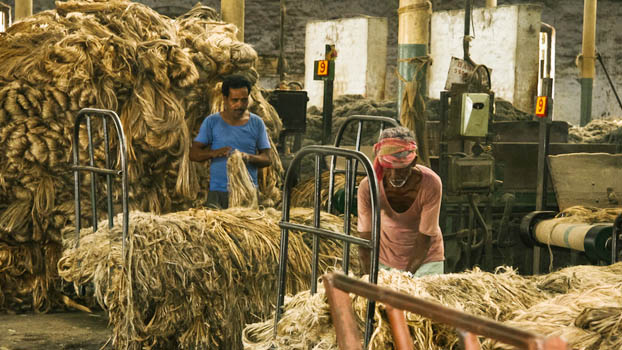Jute exports keep soaring despite pandemic

Jute and jute goods export has maintained an upward trend amid Covid-19 pandemic as export earnings from this sector soared 31.63 per cent year-on-year to US$1161.48 million in the just concluded fiscal 2020-21 (FY21).
Bangladesh fetched a total of US$882.35 million from exporting raw jute and jute goods in FY 2020.
In FY 2021, the country fetched 41.61 per cent higher earnings totaling $799.04 million from jute yarn and twine export against US$364.26 million in FY 2020, according to the latest data of Export Promotion Bureau (EPB).
Export earnings from jute sacks and bags have also soared 30.16 per cent reaching $138.66 million in FY 2021, which was US$ 106.54 million in FY 2020, said EPB.
Millers said sales of 100,000 bales of previous stocks of jute sacks by state-run Bangladesh Jute Mills Corporation and private mills and higher demand for new carpets in the west amid increasing stays at homes for lockdowns buoyed shipments of jute yarn.
"Export value has increased mainly because of prices of raw jute," said an official of Akij Jute Mills (AJM).
Prices of raw jute, the key ingredient of jute yarn, almost doubled from around Tk 2,200 per maund (around 37 kilogrammes). And this is being reflected in the export receipts, said the official.
Citing examples of jute yarn, which accounts for more than three-fourth of the country's export proceeds from jute and jute goods, the AJM official said average monthly shipment from country's premier Chattogram Port was over 38,704 tonnes, up 3.5 per cent from that in the previous year.
This is a record export growth in value registered by millers and exporters in recent years. Jute and jute goods exports rebounded in FY21 after a fall in FY19.
In FY21, export earnings continued to stay positive, thanks to production shortages in two major jute producing nations, Bangladesh and India, and relatively good demand for jute goods and yarn, according to jute traders.
The traders said FY21 was an unusual year for the jute sector.
"It is an exceptionally good year for jute exports as shipments have not declined. Instead, it has increased," said a trader.
The Department of Agricultural Extension (DAE) estimates that farmers bagged 72.86 lakh bales last season after counting flood related losses.
According to the Bangladesh Jute Spinners Association (BJSA), country's jute mills require 55 lakh tonnes of raw jute to make yarn and other jute goods.




